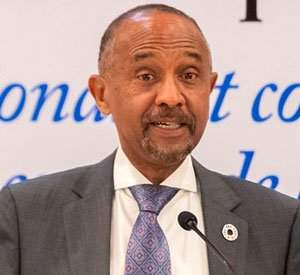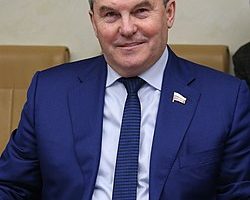
BY STAFF REPORTER –
Mr. Gabriel Negatu is a Senior Fellow, Atlantic Council/Africa Center; specializing on Eastern & Horn of Africa, based in Washington, DC. He also served as Director General of the African Development Bank (ADB). The Ethiopian Herald approached him for interview on issues related to the implication of the U.S. economic and security restrictions on Ethiopia.
To what extent has the US taken into consideration the economic, social and political dynamics in Ethiopia before imposing the sanctions?
Ethiopia and the U.S. have enjoyed various levels of diplomatic relations for over 100 years. There are not many countries in this continent or elsewhere that can claim such longevity. However, it’s not apparent that this association was factored into the U.S. decision to impose punitive measures.
The century old fraternity did not accord the U.S. a better grasp and value of the unfolding complexities in Ethiopia nor enabled it to pursue a nuanced strategy to address the challenges facing an important ally. Though I’m not privy to behind the scene bilateral exchanges between the two, one would, at a minimum, expect the US to address the “delays in ending the hostilities in the country” in a much more astute, judicious and dispassionate manner. Take for example the well performing Ethiopian economy that was beginning to bounce-back from multiple stressors such as the Tigray conflict, COVID-19, a ruinous Locust invasion and the organizing national elections. Imposing wide-ranging restrictions on economic assistance to 115 million people in the midst of a recovery is misguided at best; bordering on willful effort to cripple the economy from future recovery.
Similarly, Ethiopia’s political terrain has been muddled over the past three years. Attempts to usher in political liberalization and steer the transition to federal multi-ethnic constitutional democracy has unleashed untold number of challenges and conflicts. Here again, it is unfitting for a longstanding ally, actively engaged in diplomatic talks through its newly appointed Special Envoy, to aggravate existing fragilities by rushing to decree wide-ranging punitive measures. The US employs sanctions more than any other country in the world. Without being prejudicial to the stated reasons for the imposed sanctions and restrictions, one can reasonably conclude that the timing and scope of the US action was ill-advised and fails to take into account the complexities on the ground. Similarly, beyond the feel- good factor, the instruments of choice to bring about the desired policy changes are deemed inappropriate and possibly counterproductive.
How will the sanctions imposed on economic assistance affect Ethiopia’s development?
Overall, the US imposed economic sanction serves as a blunt instrument likely to impact the whole economy; with very few discriminatory measures to mitigate its unintended negative impact. However, there is no reason to expect the economic sanctions will bring about the desired results. As pointed out earlier, the Ethiopian economy has been a consistent performer for some time. All key indicators point to an economy that has not only achieved robust growth but is also inclusive and sustainable. Over the past decade, Ethiopia has been able to lift many of its citizens out of poverty. The economic liberalization of the past few years has further accelerated Ethiopia’s transformation. The home-grown economic transformation strategy is beginning to bear fruits at the macro and sector levels and the results are there for everyone to see. This is not to say the economy wasn’t facing challenges, it had indeed its share of challenges.
As with every transformation, the transition period is always the most difficult and Ethiopia is no exception. The economy continues to suffer from a large debt overhang, foreign currency shortages—in the short and medium term, a sluggish demand for services and the slowdown in the global economy remain a binding constraints.
The U.S.’s restriction on economic assistance must therefore be understood in the context of such precariously balanced transition. The restriction on economic assistance may hurt Ethiopia in two critical areas. The country has been the highest recipient of U.S. foreign aid in Africa—receiving close to $1bn in both military and economic assistance last year. Much of the assistance was earmarked for emergency humanitarian response, food security, health, human rights, democracy and governance. Outside the exemptions for humanitarian assistance and other life-saving interventions, the remaining balance of U.S. foreign aid is bound to have a modest impact on the Ethiopian economy.
A second and perhaps more ominous aspect of the sanction regime is a U.S. request of the Brettonwoods institutions (World Bank & IMF) to withhold Policy-Based Budget Support Loans to Ethiopia. By transferring funds directly into the national budget, policy-based support is a life-line used by most governments to offset budgetary shortfalls. The suspension of policy based lending by the multilateral Banks is certain to have a disrupting impact on the Ethiopian economy.
Though both the World Bank and IMF, in principle, do not consider internal politics in their lending decision, the voting power of the U.S. and its allies may be sufficient to block such future funding. Lastly, let me add that given the low level of economic activities between the U.S. and Ethiopia, the severity of the economic sanction on the latter will not immediately be obvious. However, the severity is likely to increase if other allies join the U.S. and impose their own restrictive measures.
What will be the implication of the said security assistance restriction on Ethiopia to the Horn region?
I believe the newly announced restriction on security assistance is a continuation of the U.S.’ decision not to lift the pause imposed on assistance for most programs in the defense and security sector.
This is a sector partnership built over many decades and at several levels. In recent years, the US and Ethiopia have worked closely; sharing views and coordinating activities on regional and local security; peacekeeping in the Horn of Africa and beyond; intelligence gathering and sharing; and strategic military relations aimed at strengthening security partnerships. The US-Ethiopia Bilateral Defense Committee, co-chaired by the top brass on both sides, is an example of a joint-platform used to increase security cooperation between the two countries in recent years.
In the face of such cooperation, I believe the security assistance restriction will have a significant implication for the region.
As you may know, for quite some time now, Ethiopia has served as the lynchpin for peace and security in the Horn of Africa. Successive Ethiopian regimes have played a significant role in conflict resolution and peacekeeping in the region. This regional peace enforcement duty was something closely coordinated with the U.S. and allies, and dutifully discharged by Ethiopia at great risk and loss.
The security assistance restriction could lead to a more inward-looking Ethiopia; keenly focused on guaranteeing peace and stability within its own borders. Consequently, Ethiopia could pull back its experienced and respected UN peacekeepers, serving from Abiye to Darfur; in AMISOM – UNMISS. This will invariably create a temporary vacuum until other nations step up and volunteer additional peacekeepers.
The most immediate implication of such vacuum on the Horn being the resurgence of groups such as Al-Shabab and the Janjaweed, I believe recent rise in violence across the region is not coincidental, but a result of such pulling back.
Lastly, the US imposed security assistance restriction could also push Ethiopia to reluctantly seek similar assistance/partnerships with other powers eager to replace to U.S. and meet the peace and security assistance needs of the country and the region.
Some say the measure being taken by the U.S. against Ethiopia would harm the U.S. itself, do you agree? If so, how?
Viewed as a foreign policy tool, the sanction on Ethiopia is likely to harm U.S. interests in the region without significantly advancing any vital interest.
Lesson from decades of imposing similar sanctions around the world points to the declining effectiveness of the U.S. sanctions to achieve the goal of forcing concessions and changing the policy and actions of target governments.
They instead deny American business access to international opportunities, delay the development process and hurt the poor. One study shows economic sanctions fail between 65-95% of the time in achieving their intended goals. Another by the Institute for International Economics found that sanctions have achieved their objectives in fewer than 20 percent of cases. There is also evidence to suggest sanctions are counterproductive in advancing human rights, democracy, and press freedom. Finally, sanctions that are poorly conceived and targeted tend to do more harm than good to the U.S. foreign policy interest.
How do you evaluate the speech made by Sen. Jim Inhofe?
Senator Inhofe is a respected member of the U.S. Congress who displays a remarkable insight into recent developments in Ethiopia and the sequence of events that led to the current crisis in Tigray. He was emphatic in labeling the TPLF a terrorist group and said it was “offensive and down-right wrong” for the Biden administration to equate the TPLF with the elected government of PM Abiy. The Senator correctly traced the genesis of the current conflict to TPLF losing its out sized influence in Ethiopian political and economic life. His 15-minute statement from the floor of the Senate narrated the reforms ushered in by the PM and expressed his highest regards for him as a leader.
He concludes by opining that the Biden administration should engage with the Addis Ababa government and help him to restore peace. The influential Senator’s familiarity with the turn of events in Ethiopia and his courage to speak the truth and to set the record straight will be impactful in the struggle for the hearts and minds of the U.S.’s policy makers. His chronicling of events stands out not for being partisan or one sided, but for exposing the truth by illuminating the other side of an often distorted and one sided narrative.
What is your advice to the US Administration on the current tense relations with Ethiopia?
If I was to advise the U.S. administration on current relations with Ethiopia, it would be not to rush to convict shame and condemn. The myriad of disputes on the ground are complex and convoluted; obliging good faith effort by all sides working in sync. The US is right to express concern about some of the violations transpiring in different parts of Ethiopia. However, the haste to deploy such a blunt foreign policy instrument, so early in the Biden/Blinken tenure, is in my view, tantamount to a premature admission of failed diplomatic enterprises.
Barely half a year since the Biden team took office, the rush to sanction overlooks a cardinal maxim that triumphant diplomacy is never rushed. Plus, resorting to sanctions in the midst of a shuttle diplomacy by the Special Envoy to the Horn makes a mockery of the appointment and undermines the Envoy’s credibility.
If the sanctions are intended to pressure the Abiy government into submission, I believe they may instead backfire. Following the law of Unintended Consequence, the U.S. sanctions have served to galvanize the country behind the PM; weeks before the country goes to the polls.
If indeed sanctions become the instrument of last choice, it is crucial for the U.S. sanction planners to tailor the ask and desired end goals to attainable targets. Demanding the removal of Amhara militia from contested areas in Tigray; an adjacent regional state, will be near impossible to enforce. Similarly, insisting Addis Ababa negotiate with the TPLF may prove to be a bridge too far. Even if the PM wanted to, the curtain has already come down on the TPLF with the People’s Representatives declaring it a terrorist organization. The lesson here is to never set targets that cause governments to regard compliance as political suicide.
Regardless of how the impact of these sanctions/restriction are measured, the U.S. must keep experienced leadership at the helm driving the process. Leadership that values and respects the bounds of sovereignty; leadership that is more considered in invoking Atrocity Crimes (genocide, war crimes & crimes against humanity). Such are laden concepts; complete with their own definition, meaning and implications; both in law and policy. Conjuring up such noble notions without due contemplation and in the face of contested/incomplete evidence devalues the dignity they impose on the activity.
The US decision to ordain sanctions and restrictions must be weighed carefully. Sometimes, a credible threat backed by a plausible preparedness to follow through with a sanction is enough to achieve the target objective. Also, the give diplomacy a chance enterprise should include Conditional Engagement—pre-sanction political and economic inducements, including financial support, negotiated behind closed doors and offered conditionally to induce specific policy and behavioral changes.
What do you recommend to the Ethiopian government in this regard?
For the Ethiopian government, the best advice is to stay the course of diplomatic engagement with the US and its allies in the search for a peaceful resolution to the current crisis. Reports of human rights violations, tortures, rapes, looting and destruction of property by various sides must be thoroughly investigated and perpetrators brought to justice.
This must be done not because of the U.S. sanctions, but because the Ethiopian people demand it and expect nothing less. As Tigray bleeds and Ataye weeps, so does the rest of Ethiopia. Such investigations and findings plus actions taken must openly be shared with the public and international partners.
The healing of Tigray and Ataye will begin where victim’s justice ends. Addis will also need to launch a bold and persistent campaign to publicize the progress made to attend to the dispute and their aftermath in Tigray and other parts of the country. This will be a first step to countering and exposing the dominant fake narrative about events in Tigray and the rest of Ethiopia.
Beyond such preliminary steps, Addis Ababa must identify key issues hindering meaningful progress to end hostilities and pursue peaceful resolution of the crisis; including rapid expansion of humanitarian assistance and removal of Eritrean soldiers. Thereafter, it must formulate a coherent positon on each point, based on national interest and willingness/capacity to implement, and engage the US diplomatically. Relations with the US and others must always remain a partnership among equals; a partnership based on shared principles and values and not foreign aid or the threat of sanctions.
Lastly, Ethiopians need to come to terms with the country’s strategic significance to the US and the rest of the world. Strategic significance is a dynamic scenario that ebbs and flows over time and changing security needs. Consequently, Ethiopians can’t remain static in their perception of the country’s geo-strategic significance. Now is a good time to interrogate long held myths about Ethiopia’s strategic in expendability and its role in the Horn of Africa.
How can the Global Diaspora be harnessed to help Ethiopia cope with sanctions?
On this matter, suffice it to say that the Ethiopian diaspora community is a sizeable and generous source, yet to be fully exploited. The global Ethiopian diaspora, although not a homogenous population by any standard, remains largely concerned about the impact of the US sanctions and is eager to do his/her share to help Ethiopia withstand the impact of this action.
In this regard, the community is mobilizing globally to push back on the false narrative about Ethiopia through social media campaigns as well as direct lobbying efforts.
Communities in North America and Europe have been particularly organized, visible and vocal in the effort to contact politicians and opinion makers and others to explain the truth about developments in Ethiopia. Through mass rallies, phone calling campaigns and other awareness raising drives across the globe, Ethiopians young and old, are taking active part in several initiatives to take back the narrative from the TPLF propaganda machinery.
Similarly, the Diaspora community, working closely with Ethiopia’s diplomatic missions has been very active in raising resources to help finance the GERD and other development projects. As Board Chairman of the Friends of Ethiopian Diaspora Trust Fund in the US (FEDTF), I have closely witnessed the outpouring of support to help Ethiopia at this time of great need.
Ed.’s note: The Ethiopian Herald appreciates Mr. Gabriel Negatu for taking his time to address all the questions in writing.
The Ethiopian Herald June 22/2021





